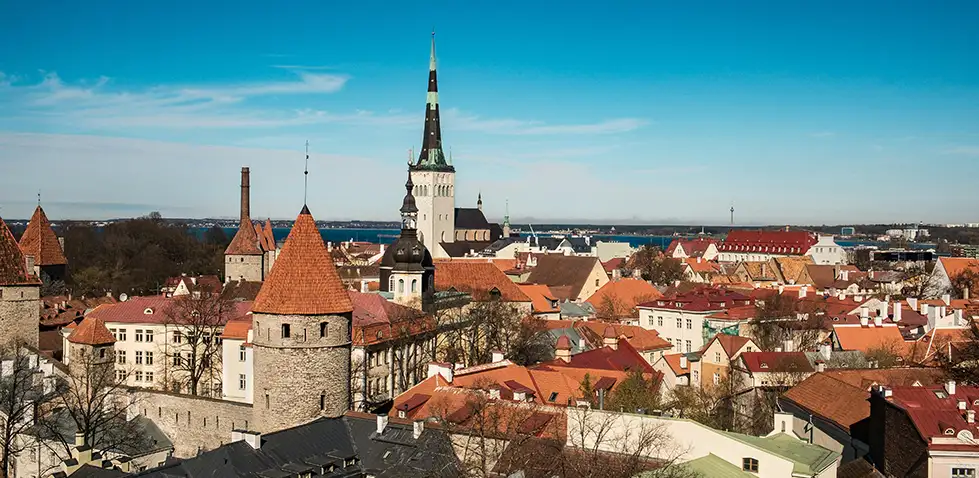

Estonia is an increasingly popular European study destination for international students, thanks to its reasonable tuition and living costs, progressive society, and its high living standards and quality of life. It is a small but ambitious country in North-East Europe, sharing land borders with Latvia and Russia, and has an extensive coastline. It is also considered one of the safest countries in the world.
Despite its small size, Estonia is a modern and forward thinking country. It is an EU member, and is located in the Baltic states alongside Lithuania and Latvia. Its location means that you will be able to easily travel around Europe and Scandinavia, making the most of your downtime to see the different cultures and experience new things.
As a European country, Estonia uses the Bologna Process and ECTS. This means that any qualifications you gain will be recognised throughout the rest of Europe. This is useful for any further studies or future employment.
Estonia is incredibly modern, and was even the first country to hold elections over the internet in 2005! It continues to hold status as a technologically advanced country, with electronic ID cards for citizens, e-voting and e-government. It is known as a tech and innovation hub, and is home to several tech companies, such as Skype and Bolt.
The climate in Estonia is mild, you would experience warm summers and cold winters. This means that Estonians spend a lot of the summer outside enjoying the green spaces and beautiful scenery, and a lot of the winter inside. If you prefer to be outside in the winter, cross-country skiing is a very popular sport!
Estonia is home to many interesting cities, some of which are popular with students and tourists alike. The most popular cities for international students are the capital of Estonia, Tallinn, and Tartu.
| Continent | Europe |
|---|---|
| Language(s) of tuition | English, Estonian |
| Universities on StudyLink | 5 universities |
| Major Student Cities | Tallinn (capital), Tartu |
Software Development and Entrepreneurship Diploma of Higher Education
Estonian Entrepreneurship University of Applied Sciences Estonia
Find out moreAs an international student, applying to an Estonian university is relatively easy. You can choose to either apply to your chosen university directly, or use the university application system, which is called DreamApply Estonia. International students will usually be required to pay an application fee for each university they apply to, regardless of the application system used.
Common admission requirements for a degree or masters degree in Estonia include:
You can find out more about applying to study at Estonian universities on our Degrees and Masters in Estonia pages.
Estonia uses the Euro (€) as its currency.
Tuition fees at Estonian universities vary depending on whether you choose a public or private institution. It will also depend on what level you are studying at, as international students can study for free in Estonia at the doctoral degree level. This does not include living costs.
On average, you should expect a bachelor's or master’s degree to cost between €1,000 and €8,000 per year. If you choose to take a specialised degree, such as a medical degree, you should expect it to cost around €11,000 per year.
Scholarships are available for international students, and are offered by universities and other organisations. It is important that you research the scholarship and funding options available to you before applying to an Estonian university.
Your living costs will depend mainly on where you live. The Estonian government recommends that students budget for around €300-€500 per month to cover your living costs. You will be required to provide proof of funding if you are applying for a temporary residence permit.
Another living cost that you should consider is health insurance. If you are an EHIC card holder, then you will be able to access the same healthcare as Estonian citizens. If you are from an EU country and do not hold an EHIC card, you should apply for one before you move to Estonia. If you do not, you will have to purchase health insurance.
If you are from any other country, you will need to either purchase a health insurance policy for your stay in Estonia, or check that your current health insurance policy is valid whilst you are in Estonia. Only certain health insurance companies are accepted by the Estonian Migration Board, so you should check with your institution or the Migration Board for more details.
International students who wish to study in Estonia might need a valid visa. If you are from an EU/EEA country (or Switzerland), you are exempt from this, and can study in Estonia without a visa. If you are from any other country, you will need to get a temporary residence permit (TRP).
For more information about obtaining a residence permit as an international student, see our Estonia Student Visa Guide.
The official language of Estonia is Estonian, but some members of the older generations still speak Russian. This is due to the historic rule Russia had over Estonia before its independence.
Most universities in Estonia offer a wide range of courses that are taught in English. If English is not your first language, you will need to provide evidence of your language proficiency, which can be done with IELTS or TOEFL test scores. If your language skills do not meet the requirements, your university may offer English language courses to help you improve.
Whilst many people in Estonia speak multiple languages, it is useful to try and learn as much Estonian as possible when you are there. This will help you with everyday communication, and will also look great on your CV, particularly if you want to work in Estonia after you have graduated.
Join the StudyLink email list and never miss a chance to turn your study abroad dreams into reality!
